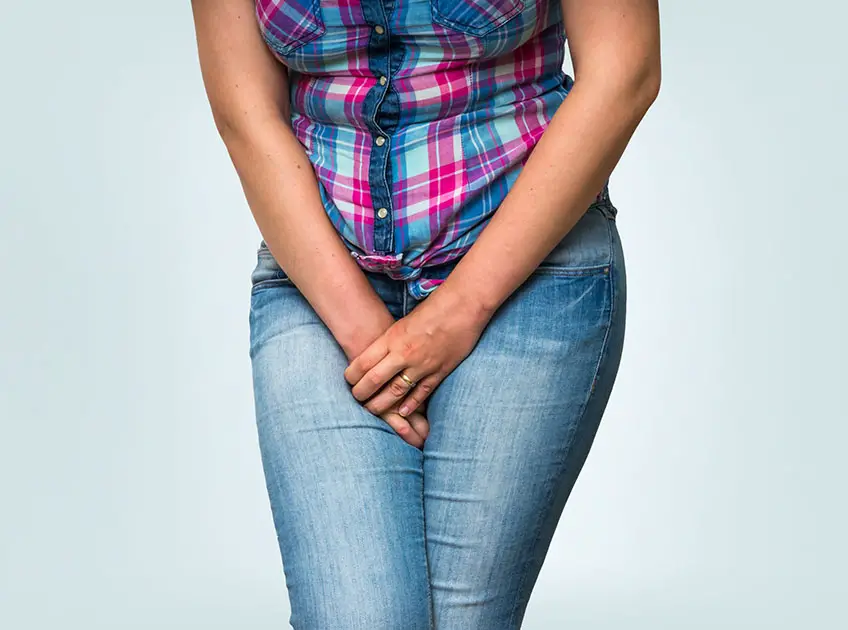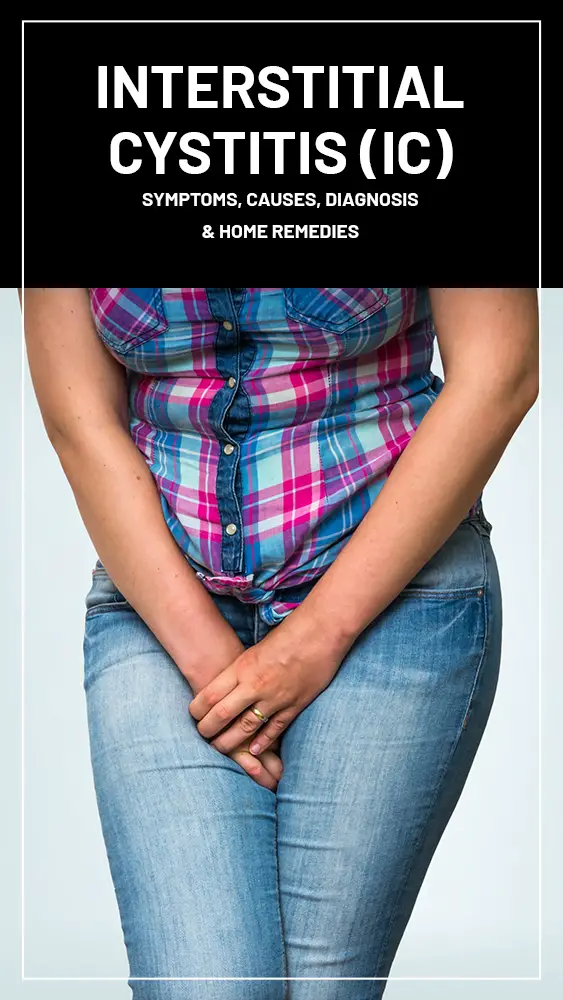
Important: This article is for informational purposes only. Please read our full disclaimer for more details.
If you have been peeing nonstop or if your bladder feels like it is never empty enough, beware. You could be suffering from IC. While these symptoms are quite similar to those of urinary tract infection, IC is not caused by an underlying infection like the former. Also, you cannot cure IC but can work towards reducing the severity of its symptoms.
Interstitial cystitis (IC) is a medical condition that is tough to diagnose. It is also referred to as painful bladder syndrome. IC is a chronic problem of the bladder. Your bladder is responsible for holding the urine after it is filtered by the kidneys. Once your bladder is full, the pelvic nerves send signals to your brain that it is time to urinate. These signals get mixed up in those suffering from interstitial cystitis and may lead to a feeling of pain or pressure in the bladder and also cause pelvic pain sometimes.
Signs and Symptoms of Interstitial cystitis (IC)
The symptoms of interstitial cystitis usually vary from one person to another. It may also flare up in response to common triggers like menstruation, stress, and exercise. The common symptoms associated with interstitial cystitis are:
- Pain in your pelvic area or between the vagina and anus in women
- Pain between the scrotum and anus in men
- An urgent and persistent need to pee
- Passing small volumes of urine frequently, say around 60 times daily
- Discomfort when the bladder fills and relief post urinating
- Pain during sexual interactions.
Causes of Interstitial Cystitis (IC)
Individuals with interstitial cystitis may have a leak in the epithelial lining of their bladder. This may cause toxic substances to enter the urine and aggravate the symptoms. Other possible (but unproven) factors that could be responsible for the development of interstitial cystitis are:
- An autoimmune reaction
- Allergy
- Infection
- Heredity – A family history of the condition.
Diagnosis
Your doctor may carry out the following tests to rule out conditions like sexually transmitted diseases, bladder cancer, kidney stones, and other conditions with symptoms similar to interstitial cystitis. They may include:
- Urinalysis And Urine Culture – Testing the urine for infections.
- Cystoscopy – Seeing the inside of your bladder and urethra using a camera attached to a thin tube.
- Biopsy – Testing your bladder and urethra tissue.
- Postvoid Residual Urine Volume – Testing the volume of urine post urinating using ultrasound.
- Prostate Fluid Culture (men) – Pressing the prostate and testing the sample.
- Bladder-Stretching – Your bladder is stretched/expanded with liquid or gas.
Home Remedies To Manage Interstitial Cystitis (IC)
Turmeric

The main constituent of turmeric is curcumin. Curcumin is a powerful antioxidant with significant anti-inflammatory properties that can help in managing the symptoms of interstitial cystitis and preventing further oxidative damage to your bladder.
You’ll Need:
- ½ teaspoon of turmeric powder
- 1 glass of hot water
Process:
- Mix half a teaspoon of turmeric powder in a glass of hot water.
- Drink the mixture as required, not more than twice per day.
- Do this when your symptoms begin surfacing.
Coconut oil

Coconut oil possesses anti-inflammatory and analgesic properties that can help reduce bladder inflammation and pain.
You’ll Need:
- 1 tablespoon of virgin coconut oil
Process:
- Consume a tablespoon of virgin coconut oil daily.
- You can also mix coconut oil with any essential oil and apply it topically to your lower abdomen.
- Do this 1 to 2 times daily.
Baking Soda
Baking soda is alkaline. This alkalinity helps in neutralizing the acidity inside your body, thus reducing inflammation and other symptoms of interstitial cystitis.
You’ll Need:
- ½ teaspoon of baking soda
- 1 glass of water
Process:
- Add half a teaspoon of baking soda to a glass of water.
- Mix well and drink up.
- Drink this mixture once on the days your symptoms flare up.
Green Tea
Green tea is a powerful antioxidant and has significant anti-inflammatory properties, all thanks to its polyphenols. It can protect your bladder cells from further oxidative damage and stress.
You’ll Need:
- ½ teaspoon of green tea
- 1 cup of hot water
Process:
- Add half a teaspoon of green tea to a cup of hot water.
- Steep for 5-7 minutes and strain.
- Drink the warm tea.
- Drink green tea twice daily for optimum benefits.
Probiotic Yogurt
Probiotics exhibit anti-inflammatory properties, which can help reduce the inflammation inside your body that may be caused by IC. They are also often used to combat urinary tract infections.
You’ll Need:
- 1 small bowl of probiotic yogurt
Process:
- Consume a small bowl of probiotic yogurt once in a while.
- Consume it once in every 2 or 3 days for best results.
[ Recommended: Baking Soda for Urinary Tract Infection (UTI) ]
Garlic
Garlic exhibits anti-inflammatory and protective effects when it comes to preventing the degeneration of the urinary bladder. It is another great remedy for managing interstitial cystitis and its symptoms.
You’ll Need:
- 2-3 peeled garlic cloves
Process:
- Chew on two to three garlic cloves daily.
- You can also add garlic to your favorite cuisines.
- Consume garlic daily.
Aloe Vera
Aloe vera is popular for its healing properties. It contains naturally occurring mucopolysaccharides, which makes it a great option for managing IC. It does so by replenishing the defective mucosal surface of the bladder.
You’ll Need:
- ¼ cup of aloe vera juice
Process:
- Drink one-fourth cup of aloe vera juice daily.
- You can also take up to 500 mg of aloe vera supplements after consulting your doctor.
- Drink aloe vera juice once daily.
Ginger
The active constituent of ginger is gingerol. This compound is anti-inflammatory and analgesic and can thus help reduce the pain and inflammation of your bladder.
You’ll Need:
- 1 teaspoon of minced ginger
- 1 cup of hot water
Process:
- Steep a teaspoon of minced ginger in a cup of water.
- After 5 to 7 minutes, strain the ginger tea.
- Consume the tea before it runs cold.
- Drink ginger tea at least 2 to 3 times daily.
Given that interstitial cystitis has no cure yet, those affected by it should keep a strict check on their lifestyle and diet to prevent the condition from worsening. If you are already on medications, use these remedies and tips in conjunction with them, but only after consulting your doctor about the possible interactions between the two.
Recommended Topics:
- 7 Best Essential Oils For Ganglion Cyst
- Clove Oil for Dry Socket: Try This Effective Home Remedy
- 5 Essential Oils For Diverticulitis
- 10 Natural Home Remedies for Flu Relief
- Why Do My Farts Smell Like Death?
- How to Use Oregano Oil for Candida
- 11 Side Effects Of Drinking Too Much Water You Must Know About
- 15 Side Effects Of Amla You Should Be Aware
- How Much Water To Drink To Flush Out Soda
















